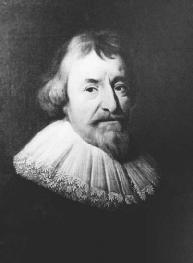Mare Liberum (1609) by Hugo Grotius is one of the earliest works on law of the sea.
Amid growing competition over sea trade, Dutch jurist and philosopher Hugo Grotius—considered the father of international law generally—wrote Mare Liberum (The Freedom of the Seas), published in 1609, which set forth the principle that the sea was international territory and that all nations were thus free to use it for trade. He premised this argument on the idea that “every nation is free to travel to every other nation, and to trade with it.” Thus, there was a right to innocent passage over land and a similar right of innocent passage at sea. Grotius observed that unlike land, on which sovereigns could demarcate their jurisdiction, the sea was akin to air, a common property of all:
The air belongs to this class of things for two reasons. First, it is not susceptible of occupation; and second its common use is destined for all men. For the same reasons the sea is common to all, because it is so limitless that it cannot become a possession of any one, and because it is adapted for the use of all, whether we consider it from the point of view of navigation or of fisheries.
Mare Liberum (or The Freedom of the Seas) is a book in Latin on international law written by the Dutch jurist and philosopher Hugo Grotius, first published in 1609. In The Free Sea, Grotius formulated the new principle that the sea was international territory and all nations were free to use it for seafaring trade. The disputation was directed towards the Portuguese Mare clausum policy and their claim of monopoly on the East Indian Trade. Grotius wrote the treatise while being a counsel to the Dutch East India Company over the seizing of the Santa Catarina Portuguese carrack issue. The work was assigned to Grotius by the Zeeland Chamber of the Dutch East India Company in 1608.
Mare Liberum was published by Elzevier in the spring of 1609. It has been translated into English twice. The first translation was by Richard Hakluyt, and was completed some time between the publication of Mare Liberum in 1609 and Hakluyt’s death in 1616. However, Hakluyt’s translation was only published for the first time in 2004 under the title The Free Sea as part of Liberty Fund’s “Natural Law and Enlightenment Classics” series. The second translation was by Ralph Van Deman Magoffin, associate professor of Greek and Roman History at Johns Hopkins University. This translation was a part of a debate on free shipping during the First World War, and was published by the Carnegie Endowment for International Peace and Oxford University Press in 1916 as The Freedom of the Seas, Or, The Right Which Belongs to the Dutch to Take Part in the East Indian Trade.

